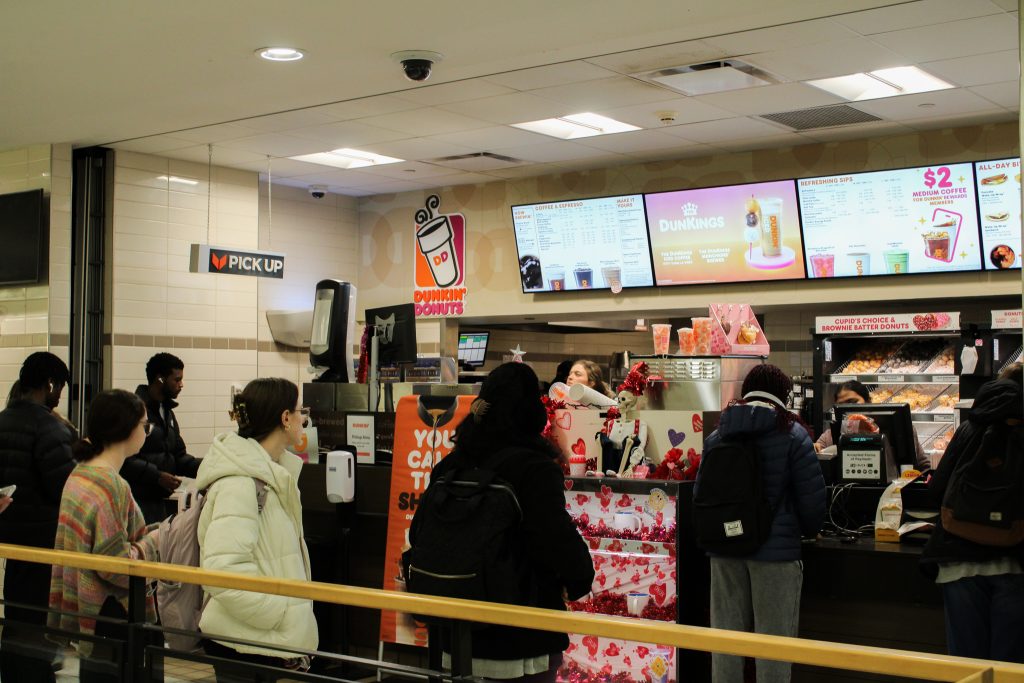Sodexo and Binghamton University Dining Services (BUDS) were planning to replace cashiers with self-ordering kiosks at the University Union Dunkin’ over spring break. Now, after product shipping delays, the project is “on hold.”
According to Thomas LaSarso, Sodexo’s general manager of retail operations, the self-service screens will shorten wait times and improve service. Sodexo and BUDS administration confirmed during a meeting with the Student Culinary Council and Auxiliary Services that “the project is on pause.”
“BUDS’ greatest asset is the employees who serve the [campus community] every day,” LaSarso wrote in a statement. “We value the job they do to ensure service excellence for our customers. The change we are making at Dunkin’ will not cause any cashiers to lose their employment. The two cashiers affected will work with management and be placed in new positions.”
He added that there will be no period that the current cashiers will be out of work and that they can bid for other positions on campus. It is not yet clear what those roles will be or whether or not these new roles will still allow them to interact with students. LaSarso declined to provide further comment.
Alana McKeon, the president of the Student Culinary Council and a senior majoring in environmental science, confirmed that because of a backorder on some products, the cashiers will likely still be working there after spring break. McKeon shared the potential impact on campus.
“Especially when you have cashiers like Tammy and Chad who are so wonderful and kind, it’s hard to see them go,” McKeon wrote in an email. “Everyone is going to miss that personal touch. If you’re a student who goes to Dunkin’ every day, at this point, the cashier behind the counter may know you by name and what coffee you want. That’s enough to make someone’s morning — to make them feel special.”
Other dining locations currently using a form of self-ordering kiosks include the Chenango Room and Shake Smart in the Marketplace. McKeon said that the screens at Dunkin’ should operate similarly, with a staff member available to answer questions or take an order, should a customer prefer not to use the screens. Self-service kiosks have decreased wait times by up to 40 percent, according to the National Cash Register Corporation.
A Sodexo employee who works in the Marketplace sympathized with students’ frustrations surrounding the change but expressed hope that they will adapt to the kiosks as quickly as they did with Shake Smart’s updated ordering system.
“The kiosks will hopefully allow for quicker ordering so that students can get to class on time,” they wrote. “Although it is a definite change, I am hoping that in the end it will be a positive change to the store.”
McKeon emphasized that the screens will help combat University employee shortages.
When the news first spread on social media, students expressed concern that the Dunkin’ cashiers would lose their jobs. McKeon expressed her hope that students will embrace this decision now that it is clear the affected cashiers will remain employed.
Mugheesah Alidina, a senior double-majoring in English and geography, said the screens have the potential to take away from the “person-to-person interactions that happen on a daily basis.”
“It could lead to an increase in social isolation and would be problematic for those who need personal assistance,” Alidina wrote. “Some people, such as myself, have their days made by speaking to someone while ordering. Whether it’s by being asked how we’re doing or being told to ‘have a nice day,’ the human interaction is something that will be missed out on with the implementation of the tablets.”



